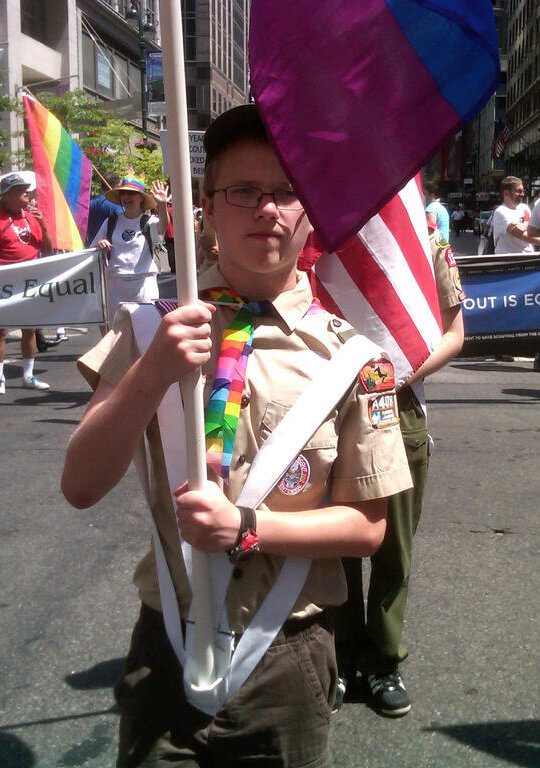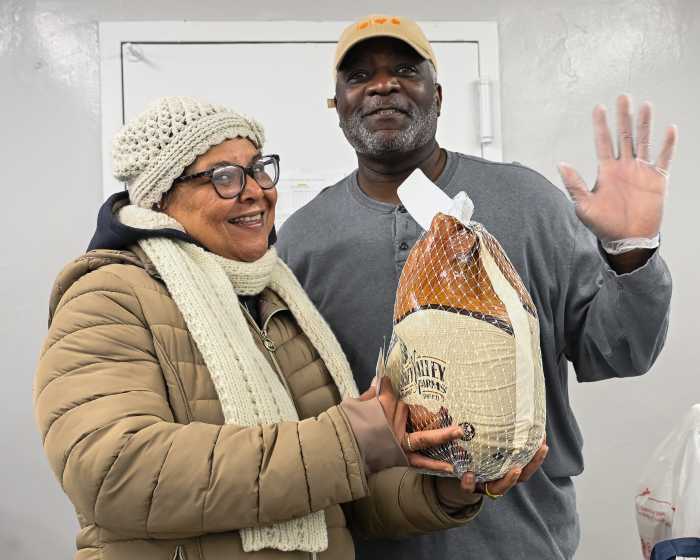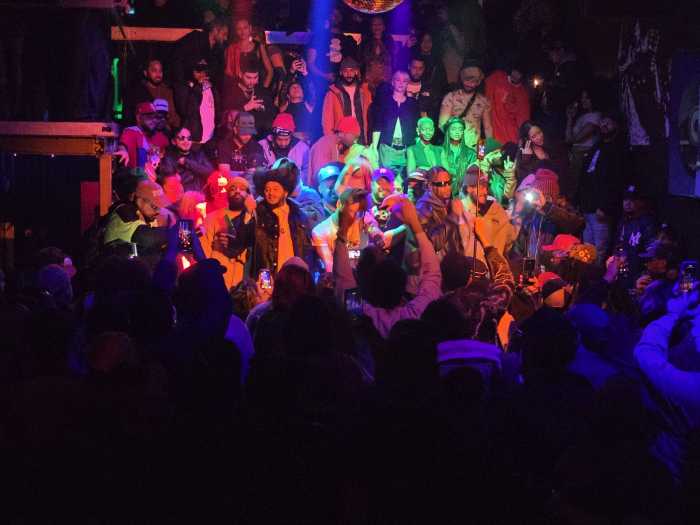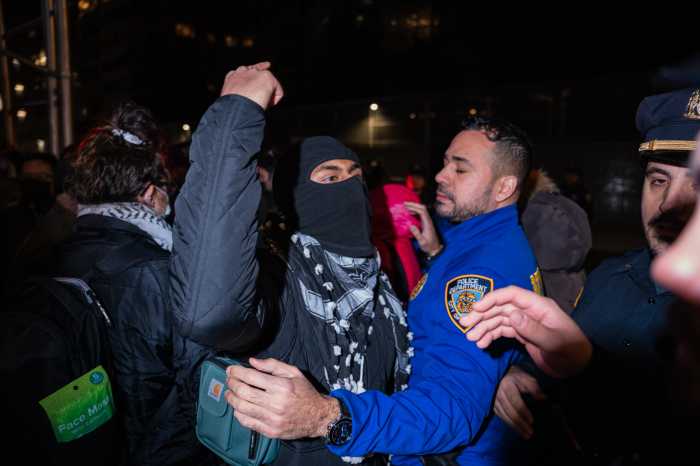BY ANDY HUMM | Ten days before the Human Rights Campaign shifted course and spoke out against the broad religious exemption in the current version of the Employment Non-Discrimination Act — the federal LGBT job rights bill — it was clear the provision was in trouble. The city’s June 29 LGBT Pride March evidenced clear and growing opposition among both activists and New York’s elected officials, including members of the US House of Representatives who could decide ENDA’s fate, even if not this year. The measure passed the US Senate last year but is stalled in the Republican-controlled House.
And while President Barack Obama’s announcement that he is drafting a long-demanded executive order to ban anti-LGBT bias by federal contractors, the call from conservatives for him to include a similar religious exemption is creating angst among community leaders. Matt Foreman, who formerly led the National Gay and Lesbian Task Force (NGLTF) as well as the Empire State Pride Agenda, has termed that possibility a “crisis situation.”
Most civil rights laws have some “ministerial exemptions” for religious groups, but even faith congregations are bound not to discriminate in jobs not directly related to their religious mission. But ENDA, in its current form, would allow a Jewish hospital, for instance, to fire doctors and nurses for being gay or lesbian.
Elected officials, grassroots advocates voice opposition to loopholes in ENDA, Obama executive order
When religiously-affiliated groups such as Catholic Charities agree to take public funds in a place such as New York City, they also agree not to discriminate in hiring or the provision of services, including on the basis of sexual orientation and gender identity. But US Senator Orrin Hatch, a Utah Republican, and religious leaders such as the Reverend Rick Warren, who led the prayer at Obama’s first inauguration, are demanding that religiously-affiliated contractors be able to take federal money and discriminate, but only against LGBT people.
Gay City News surveyed some of the elected officials who showed up on Fifth Avenue on June 29 for the 45th annual march commemorating the Stonewall Rebellion, especially Democratic members of Congress who are ENDA sponsors, about the controversy.
West Side Representative Jerry Nadler said, “I don’t think that it should have a religious exemption broader than the Civil Rights Act. There is a place for a religious exemption, but if it is broader than that I probably would not support it. I hope it doesn’t come to that.”
Then, referring to the controversy about the elimination of the gender identity protections in the version of ENDA approved by the House in 2007, Nadler added, “We should have learned our lesson from the transgender” dispute.
As the measure moved toward a vote that year in the House, then controlled by the Democrats, its chief sponsor, Barney Frank, an out gay Massachusetts Democrat who has since retired, agreed to drop “gender identity and expression” to win greater support — a move endorsed by the Human Rights Campaign but denounced by hundreds of LGBT groups across the country, including NGLTF, then led by Foreman. The bill passed, but seven Democratic members of Congress, including Nadler, voted against it because they insisted on a more inclusive bill, only to find themselves downgraded by HRC in the group’s annual legislative ratings.
HRC has since pledged never to jettison transgender coverage again, but in the effort to win Republican support for ENDA in the Senate last year compromised on another key issue, with an exemption that would have sacrificed the rights of LGBT people who work for religiously-affiliated institutions. In its new position announced on its blog and at Buzzfeed.com July 9, the group said its continued push for ENDA depends on “a narrowed religious exemption.”
Boy Scout Michael Brownstein, 15 and not gay, marching with his father, who is also not gay but was expelled as a scoutmaster in Salt Lake City after the two Brownsteins delivered pizzas to same-sex couples waiting to marry in Utah during the brief window that right was available there. | GAY CITY NEWS
Both New York Maloneys in the House are also troubled by the bill as it currently reads. Congresswoman Carolyn Maloney of Manhattan’s East Side said she is “objecting to the exemption” but does not see ENDA coming up in this gridlocked Congress in any event.
Out gay Congressman Sean Patrick Maloney, who represents a Hudson River Valley district upstate, said, “I feel it is very important that it not be that broad.”
Other local officials also have concerns. State Senator Brad Hoylman, an out gay West Side Democrat, said, “I don’t support the broad religious exemption.”
City Councilman Corey Johnson, an out gay Chelsea Democrat, said, “We need to close that religious loophole while looking at more comprehensive legislation that covers housing and public accommodations.”
Assemblyman Dick Gottfried, also a Chelsea Democrat, agreed with the other critics, saying that a religious exemption needs “to be very limited to groups that are congregations.”
Rea Carey, NGLTF’s current executive director who was one of the grand marshals of this year’s march, said, “We’re working for the best ENDA and we don’t like the religious exemption. We still need to educate members of Congress about it.”
Her group officially pulled its support for ENDA’s current version on July 8, one day ahead of HRC’s announcement that it was changing course.
Marching with a big “Seek Full Equality” banner, Todd Tif Fernandez has long advocated dumping ENDA and going back to the original approach to LGBT federal rights by amending the 1964 Civil Rights Act to add “four words” — “gender identity” and “sexual orientation.”
He said, “The time for full LGBT equality is now.”
That, too, is a position that HRC has now moved to. Though its July 9 statement did not explicitly call for amending the 1964 Act, the group said it now supports “a fully comprehensive LGBT civil rights bill… that, at long last, would bar discrimination on the basis of sexual orientation and gender identity in all core civil rights categories — including housing, public accommodations, credit, education and, if ENDA fails to pass, in employment.”
Fernandez made his case in the New York march, at a White House briefing for LGBT leaders the following day, and to the president himself at the June 30 White House Pride reception. He is among a group of activists who launched the Equality Pledge Network, with the theme “Add 4 Words,” at the Martin Luther King, Jr. Memorial in Washington later that evening.
“I spoke to President Obama about our bill,” Fernandez posted on Facebook. “Not sure what good it did, but he said he wasn’t blocking any bill being filed, and his staff agreed to talk in more detail. I also talked with his entire team about the need for the US to have equality, questioning them all in detail at the three-hour briefing.
Queer Nation NY carried a rainbow “ENDA IS NOT EQUAL” banner that stretched across Fifth Avenue right behind its target, the HRC contingent of several dozen people — few of whom had anything to do with HRC and most of whom were from the ad firm of McCann Erickson and wearing HRC T-shirts. As Queer Nation continued to amp up pressure on the national lobbying group, Andrew Miller, an activist with the group, wrote at the Huffington Post, “It seems that HRC, the largest — and richest — LGBT-rights group in the country, could not be bothered to field a team for the largest LGBT-pride parade in the country.”
Embedded with the Queer Nation banner carriers for part of the march, I noticed many on the sidelines seemingly perplexed by what “ENDA” was. The group’s Ken Kidd, who was among those passing out thousands of fliers explaining the objections to the bill, said, “Some people knew it was about employment equality, but they’re not adequately educated about it.”
Queer Nation’s Ann Northrop chatted up HRC’s president Chad Griffin about her group’s objections to ENDA at a June reception — at which point he clearly had not come around on the need to make changes in ENDA and to seek a more comprehensive civil rights measure, as well.
“He said that there are millions of people who need these protections now” and minimized the impact on those not covered due to the religious exemption, Northrop said. “I said that, ‘You’re the new guy at HRC and you could say that you’ve taken a fresh look at this and decided that we don’t need to settle for this bill, that the country is ready for something better.’ And he said, ‘How many votes is that going to get in the Senate?’ I said, “Who thought we’d get marriage equality so quickly?’ I encouraged him to bring the bigger vision that he brought to the Prop 8 case.”
In the wake of HRC’s July 9 statement, Queer Nation “commended” the group.
Foreman, who now heads up the LGBT and immigrant rights grant-making areas at the Evelyn & Walter Haas Jr. Fund, released a personal statement last week expressing deep concern about Obama’s impending executive order, especially in light of the Supreme Court’s decision granting “closely held” companies the right to invoke “sincere religious objections” when claiming exemptions from civil law.
“Hobby Lobby dramatically escalates the harm that will be caused if President Obama succumbs to growing pressure from religious and anti-gay forces and (with implicit or explicit approval from HRC) puts an ENDA-like religious exemption in the promised Executive Order (EO) to prohibit anti-LGBT discrimination by federal contractors,” he wrote. “While largely under the radar, this is, in fact, a crisis situation.”
And referring to provisions of the 1964 Civil Rights Act, Foreman also wrote, “The only acceptable religious exemption is the one long-contained in Title VII. Anything else can spell disaster for years to come, including profoundly weakening the impact of future federal nondiscrimination laws and our hopes to secure meaningful civil rights protections in the 29 states that still lack them.”


















